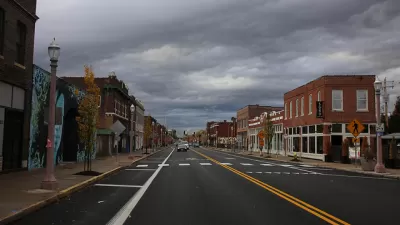The city of St. Louis is in the midst of an intense political debate—with mayoral consequences—on the subject of development incentives, which critics say just help the rich get richer.

According to an article by Jacob Barker and Koran Addo, mayoral candidates in the city of St. Louis have found an issue they can agree on: the need to reform development incentives.
According to the article, "public incentives such as property tax abatement and tax-increment financing that often subsidize [redevelopment] projects are under growing scrutiny, and candidates running to be the city’s new mayor agree that some changes in approach are overdue."
The concerns of the seven remaining mayoral candidates echo the controversies surrounding development incentives in Chicago, according to the article:
Concerns have mounted over the amount of city and school district revenue being returned to the developments, estimated at some $709 million between 2000 and 2014. Others worry the incentives mainly benefit the city’s central corridor, where most development occurs.
Outgoing Mayor Francis Slay committed to reform of the city's current system of development incentives back in October 2016, acknowledging that some projects received benefits that could have afforded to proceed without the incentives, forcing the city to forgo possible sources of revenue.
Meanwhile the issue remains a hot button for some candidates for the Mayor's Office who have voted for development incentives as previous stops in their political career.
FULL STORY: Mayoral candidates agree reform of St. Louis development incentives overdue

Planetizen Federal Action Tracker
A weekly monitor of how Trump’s orders and actions are impacting planners and planning in America.

San Francisco's School District Spent $105M To Build Affordable Housing for Teachers — And That's Just the Beginning
SFUSD joins a growing list of school districts using their land holdings to address housing affordability challenges faced by their own employees.

The Tiny, Adorable $7,000 Car Turning Japan Onto EVs
The single seat Mibot charges from a regular plug as quickly as an iPad, and is about half the price of an average EV.

Seattle's Plan for Adopting Driverless Cars
Equity, safety, accessibility and affordability are front of mind as the city prepares for robotaxis and other autonomous vehicles.

As Trump Phases Out FEMA, Is It Time to Flee the Floodplains?
With less federal funding available for disaster relief efforts, the need to relocate at-risk communities is more urgent than ever.

With Protected Lanes, 460% More People Commute by Bike
For those needing more ammo, more data proving what we already knew is here.
Urban Design for Planners 1: Software Tools
This six-course series explores essential urban design concepts using open source software and equips planners with the tools they need to participate fully in the urban design process.
Planning for Universal Design
Learn the tools for implementing Universal Design in planning regulations.
Smith Gee Studio
City of Charlotte
City of Camden Redevelopment Agency
City of Astoria
Transportation Research & Education Center (TREC) at Portland State University
US High Speed Rail Association
City of Camden Redevelopment Agency
Municipality of Princeton (NJ)





























